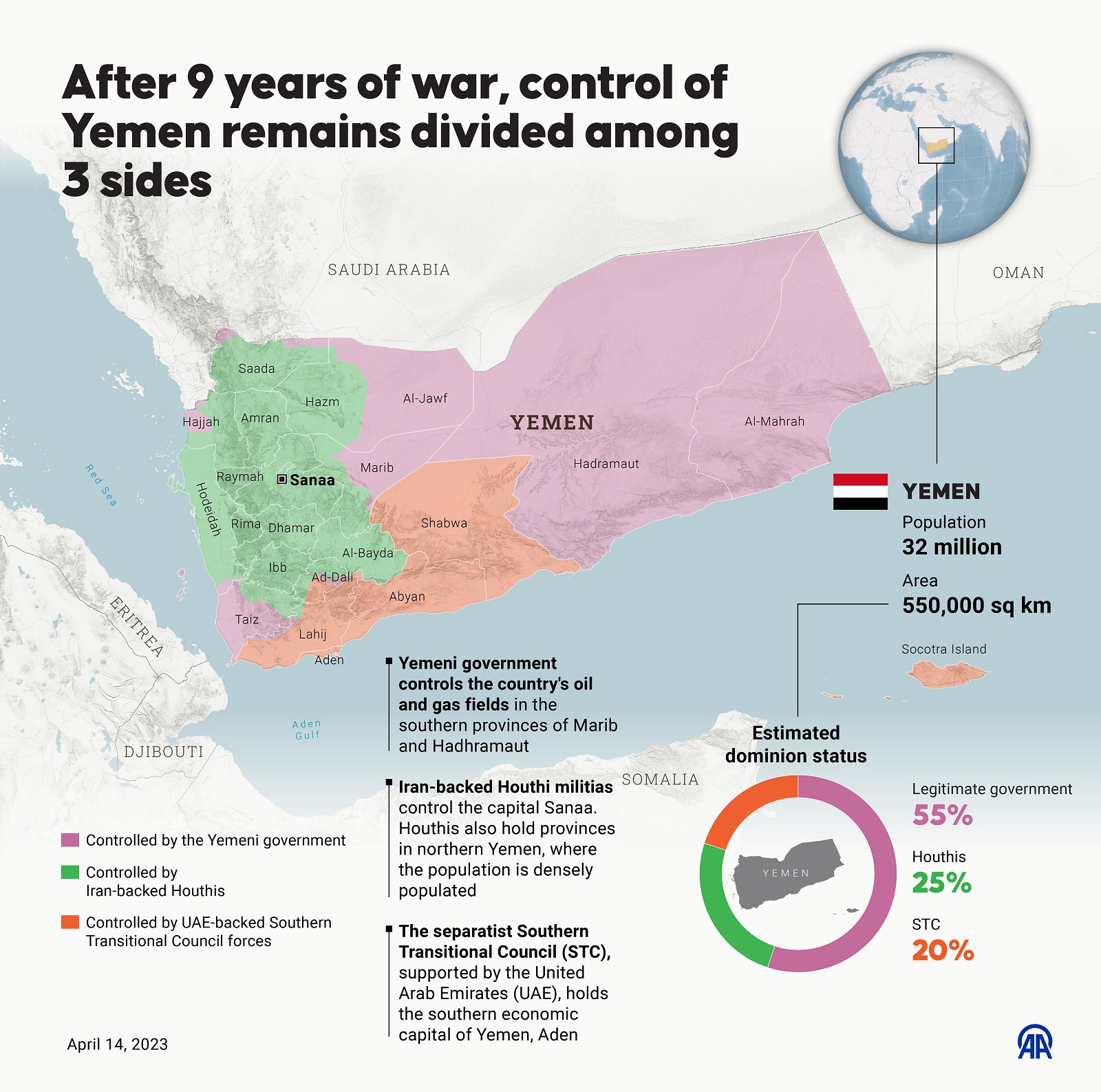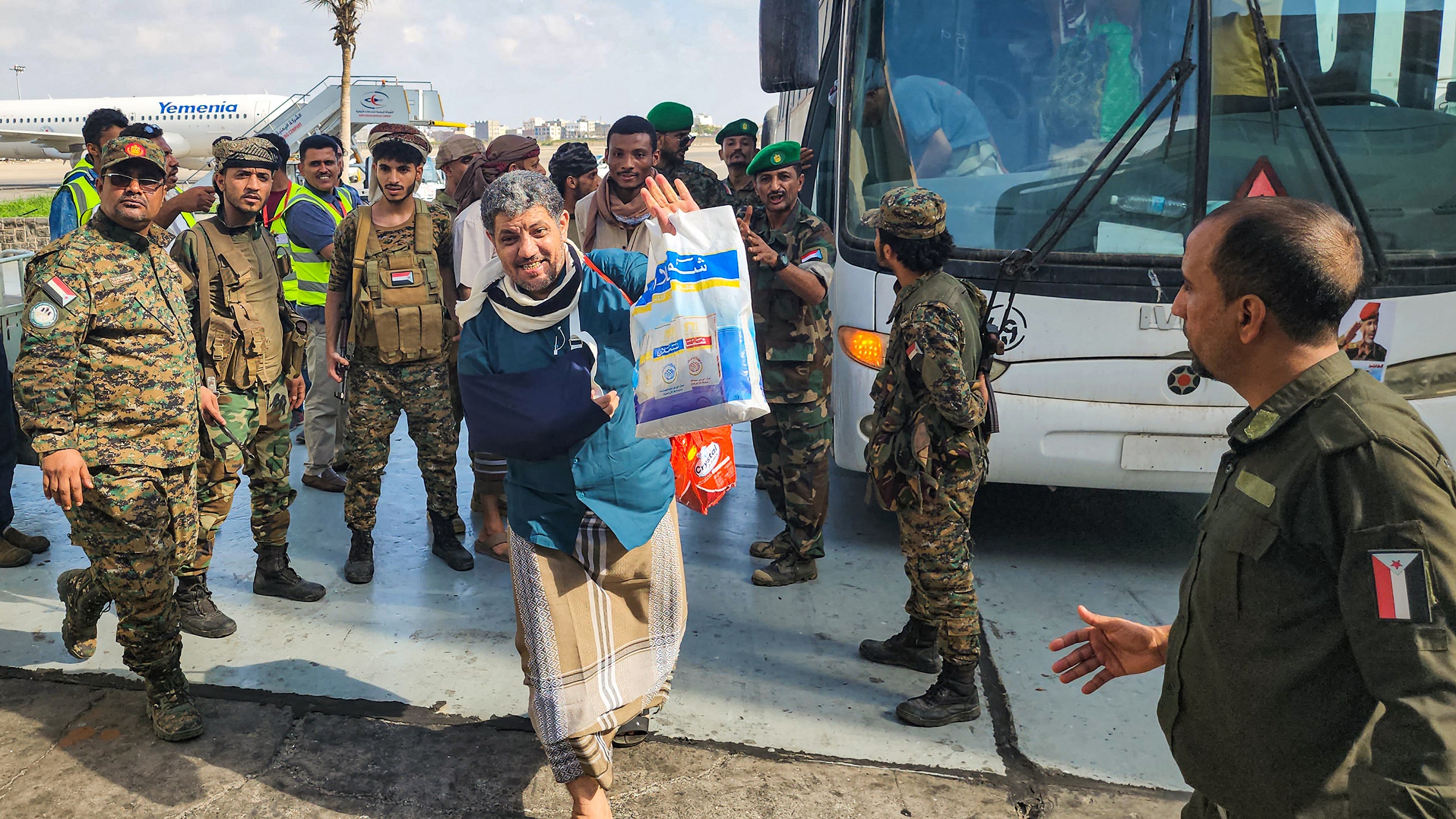Saudi Delegation Seeks End to Yemeni Civil War
Experts are divided as to whether the agreement between Saudi Arabia, which has backed Yemen’s internationally recognized government, and the Iran-backed Houthis, will result in a lasting peace
The regional order of the Middle East has been shaken up by Iran and Saudi Arabia’s agreement to restore ties after seven years without diplomatic relations. Following the agreement between them, a Saudi delegation visited Yemen this week in an attempt to reach a cease-fire in the almost decadelong civil war in Yemen.
The Saudi delegation, led by Ambassador to Yemen Mohammed bin Saeed Al-Jaber, is the first visit of its kind since Saudi Arabia launched a military intervention in Yemen in 2015.
The Saudi-led intervention followed the takeover of Yemen’s capital and the ousting of President Abed Rabbo Mansour Hadi by the Houthis, an Islamist movement made up mostly of Shia Muslims, who are a minority in Yemen. Hadi called for military support after the coup, and Saudi Arabia responded by leading a military operation together with nine other countries. Many experts describe the ongoing Yemeni civil war as a proxy war between Iran, which has backed the Houthis, and Saudi Arabia, which has backed the internationally recognized government. The UN has described the resulting humanitarian crisis in Yemen as among the worst in the world.
The Saudi delegation arrived in conjunction with an Omani delegation. Oman intends to broker a deal to reach a permanent truce and to set a time frame for establishing peace in Yemen.
The Houthis, who are the de facto authority in northern Yemen, announced on Sunday that the Omani and Saudi delegations had met with President Mahdi al-Mashat, head of the Supreme Political Council, the Houthis’ mostly unrecognized executive organization. According to a statement from the Office of the President, the group discussed the terms of the agreement, including a lifting of the Saudi blockade on Yemen, an end to the military intervention, and the use of revenue from Yemen’s oil and gas sales to pay public sector salaries.
The UN also held talks in Geneva last month to discuss the issue of prisoners of war held by both the Houthis and the government forces. A preliminary prisoner exchange deal is scheduled to start this month.
A comprehensive plan
The Houthis and the Saudis each agreed to the conditions set by the other side and an initial draft of the agreement was prepared following the talks, a source from the Yemeni Foreign Ministry told The Media Line on condition of anonymity.
The Saudis then ֿbrought the agreement to the internationally recognized government to discuss the possibility of a comprehensive political solution, the source said.
The various parties agreed to hold more talks and to set a time frame for a comprehensive cease-fire and a transitional period including economic reforms.
This holiday season, give to:
Truth and understanding
The Media Line's intrepid correspondents are in Israel, Gaza, Lebanon, Syria and Pakistan providing first-person reporting.
They all said they cover it.
We see it.
We report with just one agenda: the truth.


The deal will go through several stages, starting with the release of all prisoners of war from both sides, as was agreed in the UN negotiations.
Following the release of prisoners of war, a period of economic reforms will begin. Yemen’s economy has splintered across Houthi-controlled and internationally recognized government-controlled territories, with separate banknotes being used in the different areas. Under the reforms, the central bank will be responsible for the entire Yemeni economy. The banknotes will be standardized across the country and the government will pay the salaries of all public sector employees, including those associated with the Houthis.
After a period of reconstruction and transition, the final form of the state and the government will be agreed upon.

(Elmurod Usubaliev/Anadolu Agency via Getty Images)
The first test of the Saudi-Iran agreement
Media outlets associated with the Houthis described the agreement as a historic victory over Saudi Arabia, given that the kingdom ultimately agreed to the Houthis’ conditions.
Among average Yemenis, some see the talks as a source of hope for an end to the war, while others believe that kowtowing to the Houthis and their Iranian backers will have disastrous consequences.
This visit has revived hope among Yemenis for a comprehensive peace that would return to them what they had lost during the past years
“This visit has revived hope among Yemenis for a comprehensive peace that would return to them what they had lost during the past years,” Wedad al-Qadi, a professor of political sociology at Sana’a University, told The Media Line.
“If the parties to the conflict in Yemen agree to establish peace, then we are facing a new responsibility to rebuild the country [and] determine if the state can bring everyone under one umbrella,” she said.
Al-Qadi attributed Saudi Arabia’s willingness to make a deal to its strategy of making new allies in an attempt to achieve its political and economic goals.
If the negotiations succeed and peace is established in Yemen, Saudi Arabia and Iran’s renewed relations will be deemed an initial success, al-Qadi said.
‘Handing Yemen over to the Houthis’
Journalist Najm Al-Din Qassem was less optimistic about the talks between Saudi Arabia and the Houthis, describing the peace agreement as misguided and most likely temporary.
What is happening is a clear handover of Yemeni to the Houthis and a clear path for subsequent wars and crises
“This visit and the subsequent agreements came to hand over Yemen to the Houthis on a platter. Especially [given] that the Houthis are the ones who have the largest military arsenal in Yemen, it is stupid to repeat a previous failed experience and wait for new results,” Qassem said.
Qassem pointed to several examples of peace agreements between the Houthis and the government-backed forces that the Houthis ended up violating, including the 2014 Peace and National Partnership Agreement and an April 2022 cease-fire.
“Saudi Arabia’s exit from Yemen is what the Houthis are seeking. What is happening is a clear handover of Yemeni to the Houthis and a clear path for subsequent wars and crises,” he said.

